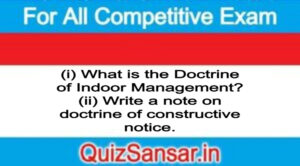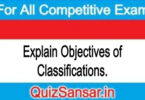
(i) What is the Doctrine of Indoor Management? (ii) Write a note on doctrine of constructive notice.
(i) What is the Doctrine of Indoor Management?
(ii) Write a note on doctrine of constructive notice.
Ans.
(1) DOCTRINE OF INDOOR MANAGEMENT
According to doctrine of indoor management the outsiders dealing with the company assume that everything has been regularly done. Outsiders assume that all documents have been seen by the company and dealing is in accordance with the law and rules. Outsiders are not bound to do more. There is no need to inquire into the regularity of the internal proceedings as needed by the MOA and AOA. Outsiders dealing with the company can presume that all is being done regularly. Doctrine of indoor management is also known as –
(1) Just Turquand Rule, or (ii) The rule in Royal British Bank Vs Turquand. This doctrine protects outsiders against the company.
The doctrine of indoor management is based on justice and public convenience.
Passing of resolution is a mere matter of internal or indoor management and its absence cannot be presented to defeat the just claim of a bona fide creditor.
Following rule was given in Fountain V. Carmarthen Rly. Co. 1868, “If the directors have power and authority to bind the company but certain preliminaries are required to be gone through on the part of the company before that power can be duly exercised, than the person contracting with these preliminaries have been observed. He is entitled to presume that the directors are acting lawfully in what they do.”
(II) DOCTRINE OF CONSTRUCTIVE NOTICE
Under the doctrine of constructive notice it is deemed that every outsider dealing with company have notice of the contents of the Memorandum and the Articles of Association. The Memorandum and the Articles of Association are such documents which are assumed as public documents. According to Section 399 of the Companies act, 2013, the MOA and AOA are deemed to be public documents. They are open to inspection by the public. Any person can examine these documents and get their copies by paying the requisite fee. It is therefore, assumed, that any person who deals with the company is familiar with the contents of the MOA and AOA.
Regarding presumption that outsiders have read Memorandum and Articles of Association Lord Hatherley observed in Mahony”. East Holyford Mining Co., (1875) as follows:
“But whether he actually reads them or not it will be presumed that he has read them. Every joint stock company has its Memorandum and Articles of Association… open to all who are minded to have any dealings whatsoever with the company and those who so deal with them must be affected with notice of all that is contained in these two documents.”
Thus anyone dealing with a company is presumed not only to have read the Memorandum and the Articles of Association but to have understood them properly.
Thus doctrine of constructive notice means presuming that outsiders dealing with company have read and understood the public documents of the company whether they have been informed of it or not. Public documents are the documents regarding which everybody has right to know and to take copy. Memorandum and Articles of Association are the public documents.
Doctrine of constructive notice is negative doctrine. It is like doctrine of estoppel. It operates against the outsiders dealing with the company. This doctrine operates regarding such documents which affect the powers of the company. This doctrine is deemed impracticable because it does not pay attention on practicability of business transaction. Due to these drawbacks Indian courts are not serious towards doctrine of constructive notice.
- What is meant by Database Management System?
- Discuss the advantages and drawbacks of database.
- What do you mean by database ? Discuss its Characteristics.
- What is Data Mining?
- What are the conditions of communication?
- What do you mean by business communication ?
- organization / Differentiate between classical and modern theory of organization
- What is forecasting






